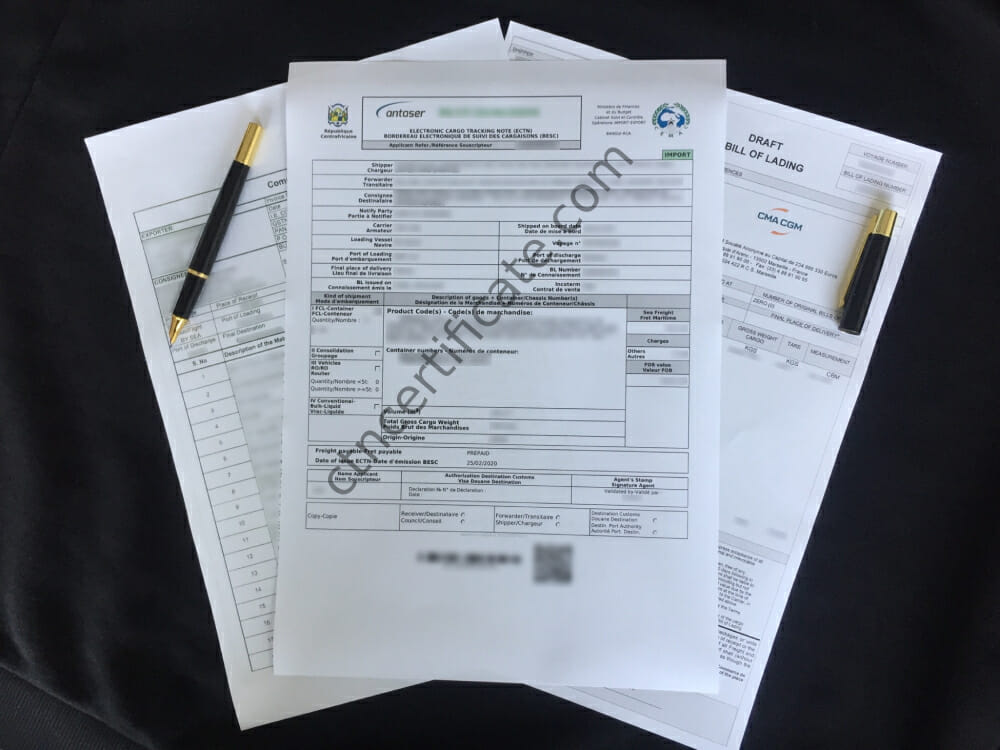ECTN for the Central African Republic is mandatory for entry into the country.
In the year 2000, Bangui Customs Officials implemented a regulation that made ECTN mandatory for all shipments to the Central African Republic. Failing to obtain this certificate will result in severe consequences and a penalty. Despite being a landlocked country, all sea cargoes are typically transported from Cameroon, but you only need an ECTN for the Central African Republic.
Click here to learn more about transit shipments.
ECTN is a mandatory certificate. However, despite its obligatory nature, it is often missed and overlooked by most people.
What is Central African Republic ECTN?
ECTN stands for Electronic Cargo Tracking Note, and its name is self-explanatory. It is a certificate that enables authorities to track, manage, and supervise all shipments from loading to discharge. Additionally, it provides information about the cargos even before they reach their destination. The ECTN includes details about the exporter, importer, information about the transported goods and their value, freight cost, shipment type, vessel name, and more.
What are the required documents?

- Bill of Lading: It contains details about the exporter, the importer, the weight of the goods, the shipping line, the vessel name, etc.
- Commercial Invoice: It includes the details of the goods, the freight cost, the incoterm, and some other charges if there is any, etc.
- Freight Invoice: This is only a requirement if the freight cost isn’t on the commercial invoice.
- Export Customs Declaration: Customs Officials of the exporter country prepares this document, and it lists the goods being transported and contains some important details of them.
What are the consequences of not having it?
The ECTN certificate must be validated five days before the arrival of the vessel at the latest. If not, there would be a fine twice the amount of the ECTN cost plus the regulation charges determined by the Central African Republic National Port Officials.
Pricing
Certificate cost depends on the number of Bill of Ladings and the containers, the country of origin, the port of discharge, etc. This is why we can’t give you an exact price for the CTN. But if you share your shipment’s details with us we can provide you the best charges for your certificate. We offer free quotation.
How long does it take to get Central African Republic ECTN certificate?
We provide draft Central African ECTN certificate within 24 hours. We provide certificates to exporters all over the World.
Why is the Central African Republic ECTN mandatory?
The Central African Republic ECTN is mandatory as per the country’s customs regulations. It serves as a tracking document for cargo entering the Central African Republic, it ensures compliance with customs procedures and facilitates smooth customs clearance.
What are the benefits of having a Central African Republic ECTN?
Having a Central African Republic ECTN helps streamline the customs process, reduces delays at the port of entry, and ensures compliance with local customs regulations. It also provides transparency and traceability of cargo, enhancing security and preventing illicit activities.
Is it possible to obtain a Central African Republic ECTN online?
Yes, online services are provided by ECTN providers like us that allow you to submit the necessary data and obtain the ECTN certificate electronically. This makes the application procedure more practical and effective.
What are the most imported items in Central African Republic?
- Petroleum products: Including gasoline, diesel, and other refined petroleum products.
- Machinery and mechanical appliances: Such as machinery parts, generators, pumps, and electrical machinery.
- Vehicles and automotive parts: Including cars, trucks, motorcycles, and their components.
- Pharmaceuticals and medical equipment: Including medicines, medical instruments, and healthcare supplies.
- Rice: The Central African Republic imports rice to meet domestic consumption needs.
- Wheat: Wheat is imported for various purposes, including bakery and food processing.
- Iron and steel products: Such as iron rods, steel structures, and construction materials.
- Electrical machinery and equipment: Including electronic devices, appliances, and telecommunications equipment.
- Food products: Including processed food, dairy products, and beverages.
- Textiles and clothing: Including fabrics, garments, and apparel.
Which countries are the biggest exporters to Central African Republic?
- China
- France
- United States
- Belgium
- Cameroon
- Thailand
- Germany
- United Arab Emirates
- India
- Netherlands
- Turkey
- Italy
- South Korea
- Spain
- Switzerland
- United Kingdom
- Brazil
- Malaysia
- Russia
- Canada
Partners and Affiliates




